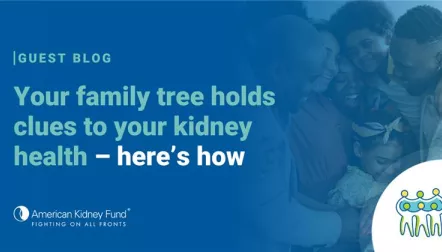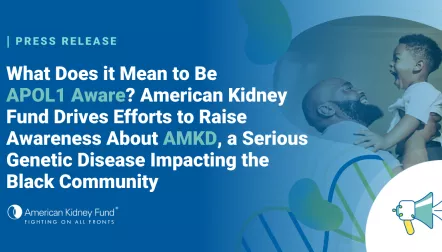
Blog post
Two posters featuring AKF courses to be presented at the American Society of Nephrology's Kidney Week 2024
AKF is pleased that two abstracts have been selected for presentation at the American Society of Nephrology's (ASN) Kidney Week 2024 in San Diego, California. On Oct. 25, AKF will present two posters on the impact of its professional education and kidney disease education courses. The first poster will outline the impact of AKF's continuing medical education (CME/CE) course on primary care provider understanding of kidney disease and genetic testing, while the other poster will give an overview of how AKF's Kidney Health Coach (KHC) online course improved confidence, knowledge and practice intentions among health care professionals. Learn more about the two posters below.

Impact of American Kidney Fund CME/CE course on primary care provider understanding of kidney disease and genetic testing
Genetic kidney diseases are increasingly gaining more attention in the nephrology space. Genetic testing has led to more accurate diagnoses and targeted treatment plans for people with kidney disease, however, it's possible that primary care providers may not immediately identify the cause of a patient's kidney disease as genetic, potentially delaying referral to a nephrologist (kidney doctor) and posing barriers to early intervention. Primary care doctors are often the health care providers who are treating people in earlier stages of chronic kidney disease (CKD), and there can be limitations in detecting genetic kidney disease and understanding of genetic testing, which can lead to missed opportunities to slow progression toward kidney failure.
To help counter these barriers and limitations, AKF and Pri-Med Institute created a one-credit CME webinar to teach primary care providers about how to make referrals to a nephrologist. Polling done before and after the course measured knowledge competence and confidence among those who participated in the webinar. Mastery and understanding of nephrology referrals increased from less than 5% prior to completion to more than 30% after completion, according to the results.
These findings illustrate the effectiveness of educating primary care providers through a CME course on genetic testing and targeted treatments. Findings also emphasize that provider education should highlight genetic testing and other CKD diagnostic procedures, especially for patients with a family history of kidney disease and patients who have the APOL1 gene mutation.

American Kidney Fund's Kidney Health Coach online course improved confidence, knowledge and practice intentions among health care professionals
People at risk for or living with CKD have unique care needs. Unfortunately, there is limited training and education on CKD prevention and management, particularly among medical professionals who work to prevent, diagnose and treat diseases and illnesses [otherwise known as allied health care professionals (HCPs)]. As a result, AKF launched KHC, a community health education program that trains HCPs and the general public on how to educate patients and the community about preventing and managing CKD. KHC features a free, two-hour online training course examining the disparities and burdens of CKD, along with diagnosis and treatment options, prevention strategies and effective methods to cater health information to specific audiences.
To learn more about the impact this course has on health care providers, AKF analyzed self-reported data from pre- and post-evaluations of the course, looking at the coaches' response about confidence and kidney disease knowledge in addition to how they answered questions about making practice changes in their role or clinical setting.
Responses showed most coaches (26%) are nurses, followed by dialysis technicians (15%) and social workers (14%).
HCP confidence in their knowledge about CKD increased from 57% to 95%.
Confidence in their ability to educate others about CKD increased from 54% to 91%.
89% of HCPs reported being confident that KHC improved their ability to better function as a member of the health care team and 64% indicated they would make changes in their practice or role.
These findings support the need to provide education and training about CKD – through programs such as KHC – to HCPs across practice settings, as KHC increased health care provider confidence and knowledge in CKD prevention and management, which leads to providers who are better equipped to meet the needs of their patients. It is crucial that more outreach is conducted to further develop and strengthen the skills, knowledge and confidence of health care professionals so that they are responsive to the needs of people at-risk for or living with CKD.





